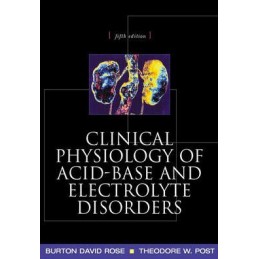- Obniżka


 Dostawa
Dostawa
Wybierz Paczkomat Inpost, Orlen Paczkę, DHL, DPD, Pocztę, email (dla ebooków). Kliknij po więcej
 Płatność
Płatność
Zapłać szybkim przelewem, kartą płatniczą lub za pobraniem. Kliknij po więcej szczegółów
 Zwroty
Zwroty
Jeżeli jesteś konsumentem możesz zwrócić towar w ciągu 14 dni*. Kliknij po więcej szczegółów
“The core of information that the clinician should possess” -- From the Preface
Doodys Core Titles for 2021!
Like its highly acclaimed predecessors, the Fifth Edition of this classic effectively integrates the essentials of renal and electrolyte physiology with the common clinical disorders of acid-base and electrolyte balance.
FEATURES::
*An easy-to-read writing style that demystifies this difficult subject
*Basic science coverage of water and electrolyte physiology, renal physiology, and regulation of water and electrolyte balance
*Clinical chapters that quickly guide you through key points of etiology, pathophysiology, symptoms, diagnosis, and treatment of common disorders
*Crystal clear figures and handy tables that summarize key information
*End-of-chapter problems that test mastery of the material
NEW IN THIS EDITION::
*New sections on endothelin and nitric oxide
*State-of-the-art information on the properties of the calcium-sensing receptor
*Revised and expanded coverage of the neurologic sequelae of hyponatremia
*In-depth discussion of the edematous states, including heart failure, nephrotic syndrome, and cirrhosis
*Hundreds of new references
Opis
Indeks: 657
Autor: Stanisław Konturek
